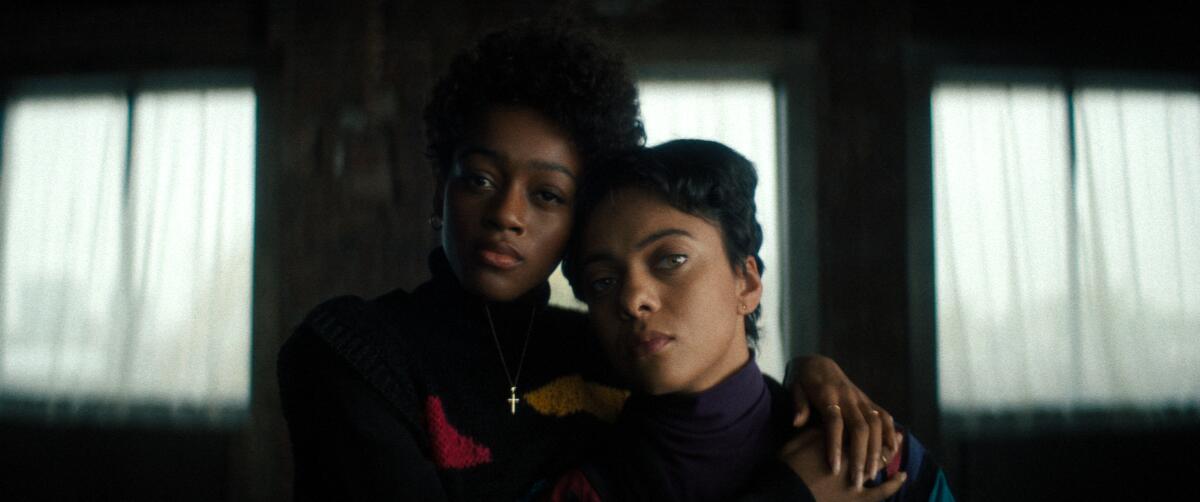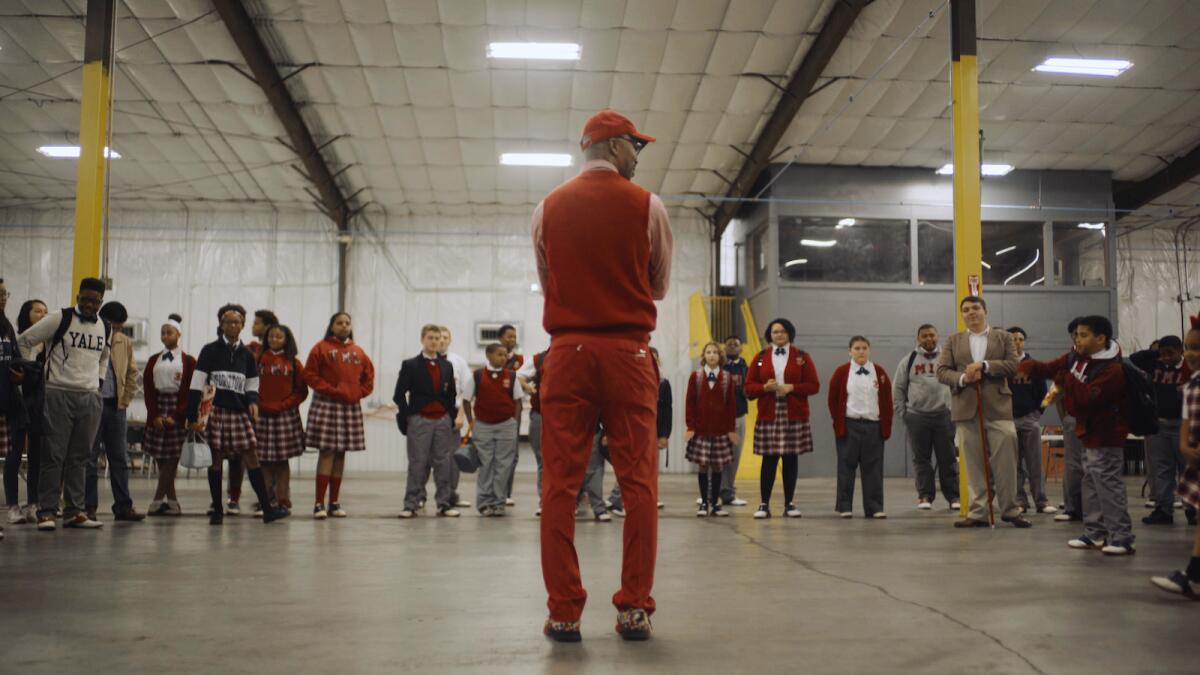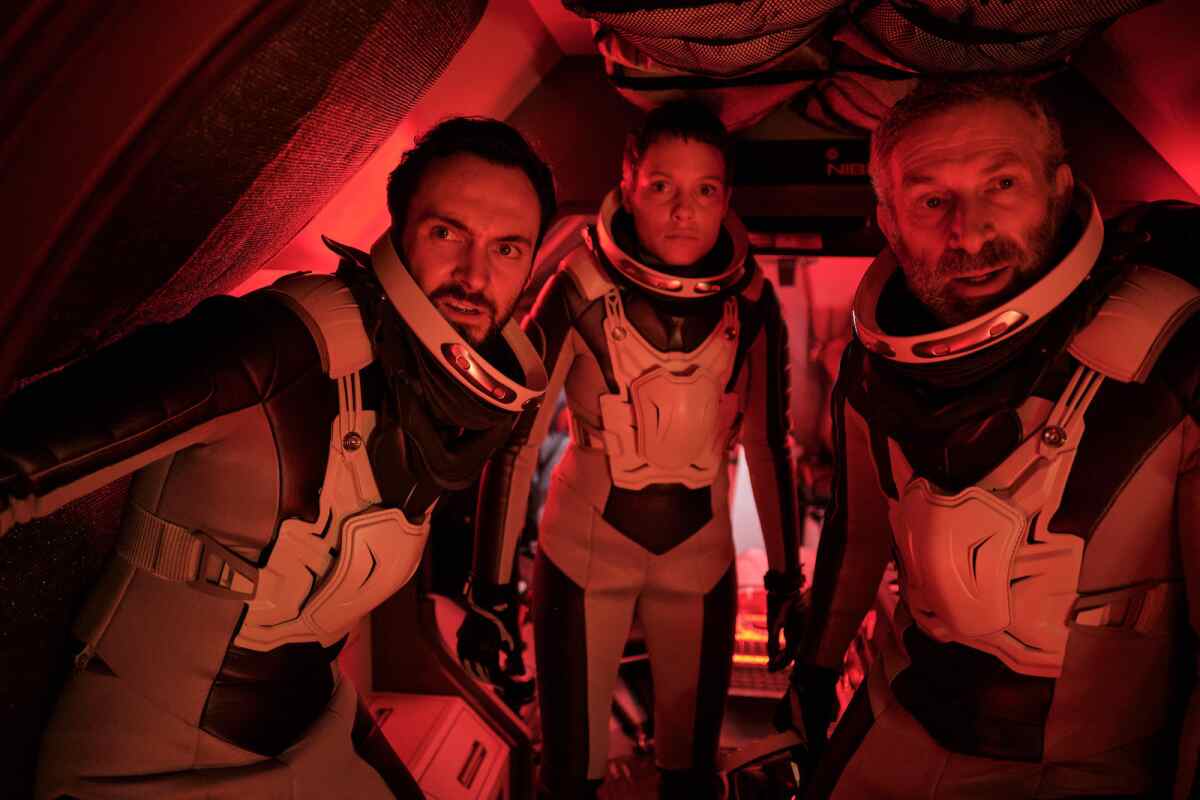Disappointing ‘Beauty,’ another college admissions scandal and more movies

- Share via
‘Beauty’
The musical drama “Beauty” should’ve been a smash. Director Andrew Dosunmu is renowned for his visually striking pictures such as “Mother of George,” which offer intense, expressionistic takes on alienation. Screenwriter and co-producer Lena Waithe is acclaimed for her work on the TV series “Master of None” and “The Chi.” The film has a grabby premise, lightly fictionalizing the story of the pre-fame Whitney Houston, here named Beauty (Gracie Marie Bradley). The cast includes Niecy Nash as the singer’s compassionate mother, Giancarlo Esposito as her domineering father and Sharon Stone as the manager who wants her to be blander — meaning “whiter.”
Yet the movie’s Tribeca Film Festival premiere came and went without much buzz, and now the film is dropping on Netflix with even less fanfare. On the day it premiered on streaming, “Beauty” didn’t even have a Wikipedia page. It’s highly unusual for a project with this many big names to garner so little attention. And it’s unfortunate, too, because while “Beauty” doesn’t really work, it does fail in interesting ways.
Waithe’s version of Houston’s story — in which a phenomenally talented, easily marketable singer is secretly having a lesbian affair with her personal assistant — is suffused with personal feeling, coming from an openly gay Black woman who herself has had to hustle to make it in show business. But Waithe too often pares the story down to archetypes in ways that clumsily recall mid-20th century progressive theater. Beauty’s bickering brothers are named Cain and Abel, for example, and Stone’s character is called “Colonizer.”
Dosunmu has a few standout moments of staging, including a haunting scene where Beauty watches both Judy Garland and Patti LaBelle sing “Somewhere Over the Rainbow” and ponders which kind of performer she should be. But this semi-true story is ultimately too sketchy to have anything effective to say about Houston, mainstream success or being in the closet. On paper, this movie is really something. Onscreen, it lacks dimension.
‘Beauty.’ R, for language and drug use. 1 hour, 35 minutes. Available on Netflix.

‘Accepted’
In November of 2018, the New York Times published a story about T.M. Landry College Preparatory, an unaccredited Louisiana private school that had gotten a lot of positive national press for landing underprivileged teens in Ivy League colleges but which, according to the newspaper, had been faking transcripts and abusing students. Documentary filmmaker Dan Chen and his crew started interviewing Landry kids — along with the school’s charismatic co-founder Mike Landry — before the scandal broke, intending to follow a handful of seniors through graduation. Instead, his movie “Accepted” went a different way.
The production’s strange circumstances clearly had an impact on what “Accepted” became — and not always for the better. The story that emerged midshoot demands more investigative rigor rather than a loose collection of interviews and slice-of-life scenes. Still, “Accepted” is remarkably affecting, thanks to the way Chen works his way back to what his doc is really about.
The Landry kids who had their college dreams yanked away by the Times exposé aren’t frauds. They’re smart and vibrant youngsters who felt they needed an institution like Landry to help them make the kind of connections that rich students usually enjoy. By focusing on the collateral damage of the scandal, “Accepted” takes on the whole broken college admissions system, arguing that the obsession with “elite” universities may be an obstacle to a good education.
‘Accepted.’ Not rated. 1 hour, 32 minutes. In limited release, including the Laemmle Monica Film Center, Santa Monica; also available on VOD.

‘Rubikon’
Director Leni Lauritsch’s debut feature film, “Rubikon,” is a science fiction drama tackling big issues in a scaled-down way, putting three characters aboard a space station and letting them talk it out. Julia Franz Richter plays Hannah, a soldier on an environmentally devastated future Earth, where the wealthy live in sealed bubbles and the armies work for corporations. She and rich kid Gavin (George Blagden) visit an orbiting science lab where Dimitri (Mark Ivanir) is experimenting with life-sustaining algae-centered ecosystems. There, all three avoid the toxic cloud below that wipes out most of the planet’s population.
Aside from a scene where Hannah is on a spacewalk and sees the lights going out on Earth, “Rubikon” doesn’t have a lot of conventional genre “action.” Lauritsch and her co-screenwriter, Jessica Lind — and their very good cast — instead emphasize the interplay between this well-meaning trio, who all have different ideas about whether they should head back home to join the survivors or stay in space where their technology can keep them alive. The dialogue-heavy scenario robs the film of some tension, but the conversations are often quite exciting as these three debate what they owe to what remains of humanity, in a society that long ago stopped caring about anyone who couldn’t afford a safe place to live.
‘Rubikon.’ Not rated. 1 hour, 50 minutes. In limited release, including the Laemmle Glendale; also available on VOD.
‘The Passenger’
There are echoes of John Carpenter’s “The Thing” and “Big Trouble in Little China” in the Spanish horror-comedy “The Passenger,” a stylish first feature from co-directors Raúl Cerezo and Fernando González Gómez. Written by Luis Sánchez-Polack, the film stars Ramiro Blas as Blasco, a blustery ride-share driver who tests the nerves of his three latest passengers as he drives the women through the countryside, all while boasting chauvinistically about his bygone days as a matador and rock star. Then Blasco’s van smashes into a stranger in the darkness, and soon the driver and his fares become bonded in their fight against what turns out to be a shape-shifting alien.
The filmmakers are incredibly resourceful. While they shot “The Passenger” mostly in and around one beat-up old camper in the middle of nowhere, their movie is nevertheless suspenseful and funny, with a few good jolts and gore effects to satisfy fright fans. But the real key to this picture’s success is the character detail. Blasco in particular is no ordinary horror hero — or victim, for that matter. He’s a fast-talking eccentric, sometimes irritating and sometimes noble — like somebody who walked out of a Pedro Almodóvar film and ran smack into a monster movie.
‘The Passenger.’ In Spanish with English subtitles. Not rated. 1 hour, 30 minutes. Available on VOD.
‘Sniper: The White Raven’
The revenge thriller “Sniper: The White Raven” is simplistic but stirring: the story of a Ukrainian hippie who trains to become a lethal killer after invading Russian forces kill his wife. Director and co-writer Marian Bushan takes time to establish the idyllic life of the ecology-minded small-town physics teacher Mykola (Pavlo Aldoshyn) before a senseless act of violence upends it. After that, “Sniper” follows a conventional “raw recruit gets whipped into shape” plot as Mykola joins the army and learns to coexist with soldiers — while also impressing his superiors with his intelligence and determination. Bushan employs different styles throughout the film, revealing a knack for dynamic action that his more low-key first half-hour doesn’t suggest. He delivers the goods for anyone looking for an intense war movie — but he doesn’t let the shooting start until everyone understands the stakes.
‘Sniper: The White Raven.’ In Ukrainian with English subtitles. R, for violence, bloody images, language and some sexuality/nudity. 2 hours. In limited theatrical release; also available on VOD.
Also on streaming and VOD
“Endangered” covers the fragile state of journalism around the world as citizens increasingly get information from sketchy internet sources that vilify traditional media. Directors Heidi Ewing and Rachel Grady profile four reporters (working in Mexico, Brazil and the U.S.) over the course of one year, capturing their growing concern that large portions of the public now trust authoritarians, pundits and conspiracy theorists more than the free press. Available on HBO Max
“The Sword and the Dragon” (also known as “Ilya Muromets”) is a classic Soviet-era fantasy film, directed by Aleksandr Ptushko in the mid-1950s and then reedited and redubbed in markets around the world. Newly restored in 4K, the movie looks stunning and feels epic, telling a twisty story from Russian folklore about a knight who battles invading armies, traitors, demons and fire-breathing monsters to protect his land and family. Available on VOD.
Available now on DVD and Blu-ray
“Out of Sight” is a career highlight for the prolific director Steven Soderbergh: a slick adaptation of an Elmore Leonard novel about a veteran thief (George Clooney) who flirts and matches wits with a U.S. marshal (Jennifer Lopez). The new 4K UHD edition captures the movie’s subtle nuances of color and also includes previous versions’ excellent special features — including a fun commentary track by Soderbergh and screenwriter Scott Frank. KL Studio Classics
More to Read
Only good movies
Get the Indie Focus newsletter, Mark Olsen's weekly guide to the world of cinema.
You may occasionally receive promotional content from the Los Angeles Times.










